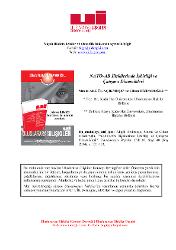| dc.contributor.author | Açıkmeşe Akgül, Sinem | |
| dc.contributor.author | Dizdaroğlu, Cihan | |
| dc.date.accessioned | 2020-09-22T11:56:31Z | en_US |
| dc.date.available | 2020-09-22T11:56:31Z | en_US |
| dc.date.issued | 2014 | en_US |
| dc.identifier.issn | 1304-7310 | en_US |
| dc.identifier.uri | https://hdl.handle.net/20.500.12469/3424 | |
| dc.identifier.uri | https://dergipark.org.tr/tr/pub/uidergisi/issue/39288/462652 | |
| dc.identifier.uri | https://search.trdizin.gov.tr/yayin/detay/157598 | |
| dc.description.abstract | Soğuk Savaş dönemi boyunca Avrupa-Atlantik bölgesinde güvenlik ve savunma alanında
NATO’nun sahip olduğu üstün konum, Avrupa’da kendi kendine yetebilen bir güvenlik mekanizmasının oluşumunu engellemiştir. Soğuk Savaş sonrasında dönüşmeye başlayan NATOAB ilişkilerinde, 1998 St. Malo Zirvesi’nin kazandırdığı ivmeyle temelleri atılan OGSP bir
dönüm noktası teşkil etmiştir. Bu tarihten itibaren iki örgüt ilişkilerinde işbirliği fırsatlarının
yanı sıra çatışma alanları da belirmeye başlamıştır. NATO-AB arasındaki ilişkilerin kurumsal
çerçevesini güçlendiren ve “Berlin-artı” düzenlemelerini de içeren bir dizi anlaşmanın varlığına
rağmen günümüzde 22 ortak üyeye sahip iki örgüt arasında etkin bir işbirliğinden söz etmek
yanıltıcı olacaktır. Başta AB üyesi olmayan NATO müttefiklerine uygulanan ayrımcılık olmak
üzere, halen varlığını sürdüren kurumlar arası ayrışma ve ikilik gibi sorunlar NATO-AB ilişkilerinde gelişimin önünü tıkamaktadır. Bu makale, iki örgüt arasındaki sınırlı işbirliğinin yanı
sıra, daha etkin bir işbirliğinin önünü tıkayan engelleri ele almaktadır. | en_US |
| dc.description.abstract | NATO’s supremacy in the security and defence structures of the Euro-Atlantic region during
the Cold War era has prevented the development of a self-sustained European security mechanism. With the end of the Cold War, specifically with the St. Malo Summit in 1998 which
was a breakthrough in the advancement of the Common Security and Defence Policy, the
NATO-EU relationship became pronounced. Since then, opportunities for and difficulties of
collaboration have both defined this inter-institutional relationship between NATO and the
EU. Despite a series of arrangements for strengthening the institutional framework of NATO-EU relations as well as the Berlin-plus agreements, the argument of an effective cooperation between two organizations would be misguided. Particularly, discrimination against the
non-EU NATO allies as well as the existence of challenges such as decoupling and duplication
are hampering progress in NATO-EU relations. This article aims at shedding a light on the
limited cooperation between these two organizations by focusing on the current challenges. | en_US |
| dc.language.iso | tur | en_US |
| dc.publisher | Uluslararası İlişkiler Konseyi Derneği İktisadi İşletmesi | en_US |
| dc.rights | info:eu-repo/semantics/openAccess | en_US |
| dc.subject | NATO-AB ilişkileri | en_US |
| dc.subject | Berlin-artı | en_US |
| dc.subject | OGSP | en_US |
| dc.subject | Kıbrıs | en_US |
| dc.subject | NATO-EU Relations | en_US |
| dc.subject | Berlin-plus | en_US |
| dc.subject | CSDP | en_US |
| dc.subject | Cyprus | en_US |
| dc.title | NATO-AB ilişkilerinde işbirliği ve çatışma dinamikleri | en_US |
| dc.type | article | en_US |
| dc.identifier.startpage | 131 | en_US |
| dc.identifier.endpage | 163 | en_US |
| dc.relation.journal | Uluslararası İlişkiler | en_US |
| dc.identifier.issue | 40 | en_US |
| dc.identifier.volume | 10 | en_US |
| dc.department | Fakülteler, İktisadi, İdari ve Sosyal Bilimler Fakültesi, Uluslararası İlişkiler Bölümü | en_US |
| dc.institutionauthor | Acikmese Akgul, Sinem | en_US |
| dc.institutionauthor | Dizdaroğlu, Cihan | en_US |
| dc.relation.publicationcategory | Makale - Ulusal Hakemli Dergi - Kurum Öğretim Elemanı | en_US |
| dc.identifier.trdizinid | 157598 | en_US |
















